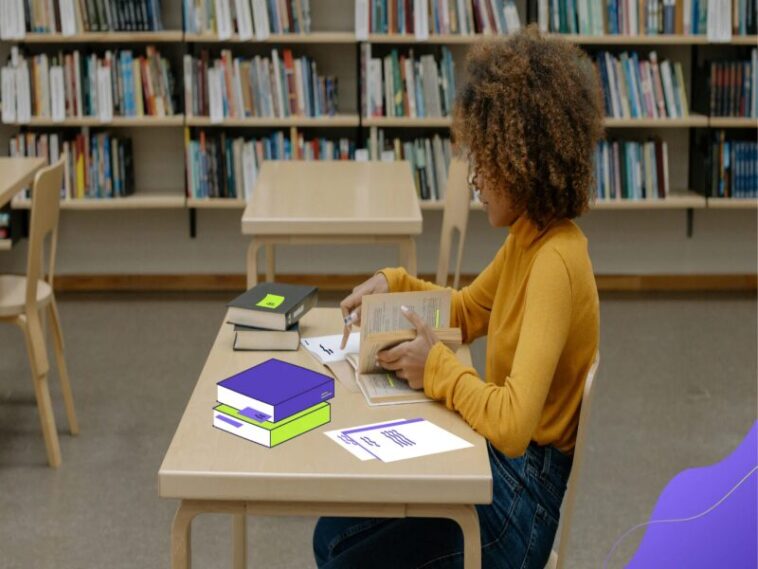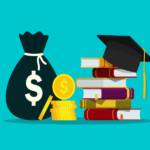Introduction
As a student, you have classes, homework, tests, social events, and maybe even a part-time job. The sheer number of jobs and duties that need your attention can make you feel overwhelmed. But do not worry, my fellow students! This piece will teach you useful tips and tricks for being more productive as a student. You’ll learn how to get more done in less time, feel less stressed, and enjoy your time as a student. – Productivity Hacks for Students

Why is Productivity Important for Students? – Productivity Hacks for Students
Reduced Stress and Improved Well-being
Having to balance social obligations, schoolwork, and personal life can be very difficult. Being too busy all the time can make you anxious, burnt out, and even hurt your health. You can take charge of your time, lower your stress, and make time for self-care if you are more productive. This will help you live a more balanced and satisfying school life.
Imagine having more time to do the things you enjoy, hang out with friends, or just unwind and recover. Being more productive can help you feel better mentally and physically, which will let you enjoy your time as a student to the best.
Better Academic Performance
Being productive and doing well in school go hand in hand. You can get better grades, understand the subject better, and reach your academic goals if you learn how to manage your time and study effectively. You can focus more on learning when you’re organized and efficient, which will help you do better in school.
Imagine doing well on your tests, finishing your work with confidence, and feeling like you’ve accomplished something in your studies. Productivity gains can help students do well in school and lead to new chances in the future.
Enhanced Learning and Retention
Productivity methods that work not only help you get more done, but they also help you learn and remember things better. You can learn things faster and remember them for longer if you focus your efforts and use tried-and-true study methods. This means having a better understanding of the material and doing better in school.
Think about learning better instead of harder. By using productivity hacks, you can get more out of your study sessions, stay focused, and remember things better. This will make your study time more useful and worthwhile.
Increased Motivation and Confidence
A positive feedback loop that boosts your drive and confidence happens when you’re busy and don’t meet your goals. This feeling of success can push you forward, making you want to take on new tasks and aim for even more success.
Imagine being proud of your time management skills and believing in your own ability to reach your goals. Being more productive can keep you motivated, boost your self-esteem, and give you the confidence to take on new tasks.
Time Management Techniques – Productivity Hacks for Students
Effective time management is the foundation of productivity. Here are some proven techniques to help you master your time and become a productivity pro:
The Pomodoro Technique
The Pomodoro Technique is a way to manage your time by breaking up your work into focused 25-minute chunks and then taking a short break. This helps you maintain focus, avoid burnout, and work with greater efficiency.
How to use the Pomodoro Technique:
- Choose a task to work on.
- Set a timer for 25 minutes.
- Give the job your full attention until the timer goes off.
- Take a 5-minute break.
- Repeat steps 1-4.
- After every four “pomodoros,” take a longer break of 20-30 minutes.
This technique is particularly helpful for tasks that require sustained concentration, such as writing essays, studying for exams, or completing complex assignments.
Time Blocking
Setting aside specific amounts of time for different activities or jobs is called time blocking. This helps you organize your time, stay focused, and make sure you give important jobs enough time. By breaking your day up into chunks, you can make a clear plan for your time and make sure you use it well.
Tips for effective time blocking:
- Plan your day: Take a few minutes each morning or the night before to plan your day and allocate time blocks for specific tasks.
- Be realistic: Don’t overestimate how much you can accomplish in a given time block. Split up big chores into smaller ones that you can handle better.
- Prioritize tasks: Schedule your most important or challenging tasks during your peak productivity hours, when you’re most alert and focused.
- Include breaks: Schedule short breaks throughout the day to avoid burnout and maintain focus. Even a 5-minute break can help you recharge and return to your work with renewed energy.
Eisenhower Matrix
The Eisenhower Matrix, which is also called the Urgent-Important Matrix, helps you put jobs in order of how important and how quickly they need to be done. This lets you focus on the most important jobs and give or get rid of the ones that aren’t as important, making sure you spend your time on what really matters.
The four quadrants of the Eisenhower Matrix:
- Do First: Urgent and important tasks that require immediate attention, such as deadlines, crises, or pressing problems.
- Schedule: Important but not urgent tasks that can be scheduled for later, such as long-term projects, planning, and relationship building.
- Delegate: Urgent but not important tasks that can be delegated to someone else, such as routine tasks, emails, and phone calls.
- Eliminate: Neither urgent nor important tasks that can be eliminated, such as time-wasting activities, distractions, and unnecessary commitments.

Productivity Hacks for Studying – Productivity Hacks for Students
Studying effectively is crucial for academic success. Here are some productivity hacks to help you optimize your study sessions:
Active Recall
Active recall is a way to study where you actively get knowledge from your memory instead of reading over your notes or textbooks. This helps make memory circuits stronger and helps you remember things longer. You’re more likely to remember the information when it’s time for the test if you do something with it.
Techniques for active recall:
- Flashcards: Create flashcards with questions on one side and answers on the other. Test yourself regularly to reinforce your learning.
- Self-testing: Test yourself on the material without looking at your notes. This helps you identify areas where you need to focus your study efforts.
- Teaching others: Explain the concepts to someone else, as if you were teaching them. This helps you solidify your understanding and identify any gaps in your knowledge.
Spaced Repetition
Spaced repetition involves reviewing material at increasing intervals over time. This helps solidify your memory and prevent forgetting. By revisiting information at spaced intervals, you reinforce your learning and improve long-term retention.
Tools for spaced repetition:
- Anki: A free and open-source flashcard program that uses spaced repetition algorithms to optimize your learning.
- Quizlet: A popular online learning platform with flashcard features and spaced repetition options.
- SuperMemo: Another powerful spaced repetition software that helps you memorize information efficiently.
Interleaving
When you learn, interleaving means switching between different subjects or topics. This helps you tell the difference between ideas and use them in different situations. By switching up your study materials, you force your brain to find information in new places, which improves your general understanding.
As an example of interleaving, don’t study the same thing for a long time. Instead, study math, history, and science one after the other. This can keep your mind from getting tired and help you use what you know in more than one area.
Making Mind Maps
Mind mapping is a way to organize and link your ideas visually. It helps you see how different ideas are connected, which helps you understand the subject better. With a visual picture of your thoughts, you can better arrange information and see how different ideas are related.
How to create a mind map:
- Start with a central topic or idea in the middle of your page.
- Branch out with related subtopics or concepts, connecting them to the central topic.
- Connect related ideas with lines or arrows to show their relationships.
- Use colors, images, and keywords to enhance your mind map and make it more visually appealing.
Creating a Productive Study Environment – Productivity Hacks for Students
Your study environment can significantly impact your productivity. Here are some tips for creating a conducive space for focused learning:
Minimize Distractions
Eliminate distractions that can hinder your focus and derail your study sessions.
- Social media and notifications: Turn off notifications on your phone and computer, or use apps to block distracting websites and apps during your study time.
- Noise: Find a quiet place to study, such as a library or dedicated study room. If you can’t avoid noise, use noise-canceling headphones to create a more focused environment.
- Clutter: Keep your study space clean and organized. A cluttered environment can lead to a cluttered mind, making it harder to concentrate.
Optimize Your Workspace
Create a comfortable and ergonomic workspace that promotes focus and concentration.
- Comfortable seating: Choose a chair that supports good posture and prevents back pain. A comfortable and supportive chair can help you stay focused for longer periods.
- Proper lighting: Ensure adequate lighting to avoid eye strain. Natural light is ideal, but if that’s not possible, use a desk lamp with a bright, cool-toned bulb.
- Organized desk: Keep your desk clean and organized with all the necessary supplies within reach. This prevents you from wasting time searching for things and helps you stay focused on your work.
Utilize Technology
Technology can be a valuable tool for productivity, but it can also be a major distraction. Use technology mindfully to enhance your study sessions.

Creating a Productive Study Environment (Continued) – Productivity Hacks for Students
- apps: Utilize productivity apps like Freedom or Forest to block distractions and track your progress. These apps can help you stay focused by limiting access to social media, games, and other distracting websites and apps.
- Note-taking apps: Use note-taking apps like Evernote or OneNote to organize your notes and access them from any device. These apps can also help you collaborate with classmates and share notes.
- Online learning platforms: Take advantage of online learning platforms like Coursera or edX to supplement your learning and access educational resources. These platforms offer a wealth of knowledge and can help you deepen your understanding of various subjects.
Taking Care of Yourself – Productivity Hacks for Students
Working harder isn’t the only way to be productive. You also need to work better and take care of yourself. Putting your mental and physical health first can make you much more productive and improve your quality of life in general.
Set goals Sleep
Sleep is important for your general health, brain function, and memory consolidation. Aim for 7 to 9 hours of good sleep every night to be as productive and smart as possible. An alert and useful mind is one that has had enough rest.
Tips for better sleep:
- Establish a regular sleep schedule: Go to bed and wake up around the same time each day, even on weekends, to regulate your body’s natural sleep-wake cycle.
- Create a relaxing bedtime routine: Wind down before bed with relaxing activities like reading, taking a warm bath, or listening to calming music.
- Optimize your sleep environment: Make sure your bedroom is dark, quiet, and cool. Invest in a comfortable mattress and pillows.
- Avoid caffeine and alcohol before bed: These substances can interfere with your sleep quality.
Stay Active
Regular exercise has many benefits, such as boosting your happiness, giving you more energy, and making your brain work better. Getting some exercise every day is important. You can do this by going for a walk, going to the gym, or joining a sports team. Going for a walk can help you relax, clear your mind, and get more energy.
Feed Your Body: A balanced and healthy food gives your body and brain the fuel they need to work at their best. Eat foods that are high in nutrients, drink plenty of water, and stay away from sugary snacks and too much coffee, which can make your energy drop. Eating well can help you concentrate, focus, and have more energy in general.
Deal with Stress
It’s no secret that stress can make you less productive and hurt your physical and mental health. To deal with stress in a healthy way, do things like exercise, meditate, spend time in nature, or do things you enjoy. Taking care of your stress well can help you concentrate, focus, and feel better all around.

Additional Productivity Tips for Students – Productivity Hacks for Students
Break Down Large Tasks
It can be scary and stressful to take on big jobs. To make them seem less scary and more doable, break them up into smaller, easier-to-handle chores. This can help you move forward without getting too stressed out.
Putting things off is the enemy of getting things done. Figure out what makes you put things off and come up with ways to avoid them. Setting due dates, using a timer, or giving yourself rewards for finishing chores are all ways to do this.
Get Good at Saying No
It’s okay to back out of plans that take up too much of your time and energy. Set your most important tasks first, and learn how to politely say no to requests that don’t fit with your goals or priorities.
Take a Break
Breaks are very important, so don’t forget that. Taking short breaks during the day can help you regroup, refuel, and get back to work with more energy. Move around, stretch, or go outside to get some fresh air.
Look back and think
Review your work and think about how you can be more productive on a regular basis. What does it work well? What could be made better? Change how you do things as needed to get more done and reach your goals.
Conclusion – Productivity Hacks for Students
You can take charge of your time, reach your goals, and have a more healthy and satisfying experience as a student by using these efficiency hacks for students. Remember that working better, not harder, is the only way to get more done in less time without putting your health at risk. To reach your full academic potential and do well in school, you should learn how to handle your time well, use effective study methods, and make self-care a priority.




GIPHY App Key not set. Please check settings